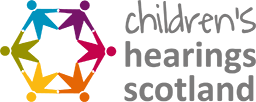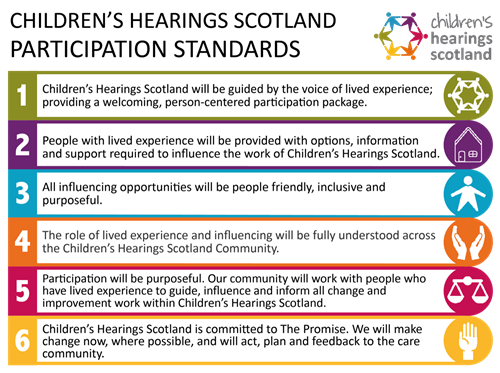
Children’s Rights and Inclusion, Progress for 2022

Jennifer Smith, Children's Rights and Inclusion Co-ordinator
If I had five words to describe my first year as the Children’s Rights and Inclusion Coordinator at Children’s Hearings Scotland, they would be the following: “Inspiring and highly caffeine-fuelled”.
We have just published our progress report on Children’s Rights and Inclusion for 2022, and I want to share some thoughts on how far we’ve come and the journey ahead.
All aboard
When I joined CHS in January 2022, I was given a clear goal: deliver the Children’s Rights and Inclusion Strategy. Like a train in motion, fuelled by The Promise and implementing a rights-based approach in line with the UNCRC, it was time for that strategy to gather momentum. Published in 2020, the strategy was developed with the crucial input of people who have lived experience of the hearings system. At its heart is the overriding commitment to put the child’s or young person’s rights and their voice at the centre of all we do, and to ensure that the inclusion and participation of children and people with lived experience of the hearings system is the golden thread throughout the work of CHS.
The important contributions of our Participation Group are a key strand of this golden thread. During 2022, the group had opportunities to meet regularly in person and online, guided by their determination to improve the Children’s Hearings System, and how we support our volunteers and staff. Making connections and building relationships throughout the year, we have expanded with the group doubling in size and involving people with lived experience from the Highlands & Moray and across the Central Belt.
The Participation Group has been a joy to work with and I want to acknowledge the important impact they’ve had, and will continue to have as we move forward – from offering views for consultations like the ‘mixed gender’ Panel Member requirement for hearings, to discussing how CHS will implement training and resources to support the potential incorporation of the UNCRC into Scots Law.
The eagerness to create a shared understanding about the value of the voice of those with lived experience has been championed all across the CHS community and supported by the Area Support Teams, the National Team and the leadership Team at CHS, and I am deeply grateful to them all.
Participation Standards
Another driving force which steered the whole year is our Participation Standards which were created in 2021 by the original four members of the Participation Group.
The six Standards were fully embedded in my work in 2022, pushing me to work with the Participation Group, CHS colleagues and partner organisations to develop a Participation Framework. Together we are building opportunities so that children and young people are empowered and have the space and support to share their insights and improve hearings.
A year down the track
Recruitment
In 2022 we conducted two rounds of nationwide recruitment for Panel Members – in most years there is only one round, but the aftermath of Covid left us with some ground to make up – and Lived Experienced Recruiters were at the heart of the process.
People with lived experience of hearings have a unique understanding of what it’s like to enter a room where decisions about your life will be made, often by people you’ve not met before. So it’s essential that we understand directly from them the skills and attributes that are most important in our volunteer Panel Members and Area Support Teams, ultimately helping children and young people have more support and better protection of their rights.
Before participating in recruitment and selection, all our Lived Experience Recruiters received training and support from our CHS Learning Academy, working closely with our volunteer Area Support Teams. Many Lived Experienced Recruiters commented that they found having a Mock Interview Skills Session to practise conducting an interview both helpful and fun. I was pleased to hear about the confidence which has grown among some of our Lived Experienced Recruiters to use the skills and knowledge they learnt in the role to successfully gain promotions and to apply for jobs.
Training about the role of being a Lived Experienced Recruiter went in both directions: in August last year I was asked to present to the Panel Practice Advisors forum on ‘Top Tips when supporting Lived Experience Recruiters’. The aim was to build confidence in those who hadn’t previously worked with young people or those with care experience. Two Lived Experience Recruiters co-produced and delivered the presentation, highlighting the mutual benefits of the role that motivated them to become recruiters – and PPAs reported that the tips were useful and they were able to implement them.
Feedback
The importance of feedback cannot not be stressed enough. It is how we learn what works well and it helps us improve what happens in hearings. Many people with lived experience have expressed their desire to have an accessible space to share their thoughts and experiences attending a hearing. It can be both cathartic and useful to put down your thoughts and feelings and for the right people to hear them. It’s our goal to use feedback to improve training and recruitment, as well as what happens in a hearing. After consulting a group of young people about the options available and the potential impact, work is well underway for a child-friendly feedback and complaints process that embeds the principles of the UNCRC.
Working in partnership
Apart from working with people who have lived experience of the hearings system, a highlight of my first year was meeting and working with colleagues from partner organisations who share the same enthusiasms and ideologies, and finding such a mutually supportive environment where we can call on each other and work towards our ambitions together.
We have a particularly strong relationship with Our Hearings Our Voice, and I’ve met with OHOV’s Project Lead and Participation Development Officer often, to share ideas for joint working and to discuss opportunities and feedback. I’ve also worked with OHOV board members, seeking their views for consultations and involving them in the co-design of the upcoming participation webpage.
Next stop: the participation station
Whatever project or task I’m working on, I return time and again to the motives of the people with lived experience who share their time, effort and insight with us. As they have told me, they are passionate about shaping the future of hearings so that those who come after them have better childhood experiences than they did, and they are passionate about the skills they are gaining through their work with CHS, about having their voice heard, about their ability to make a difference, and about helping others to have similar opportunities.
To summarise my first year in this blog post, I have drawn on an analogy I heard a young person from OHOV use recently when they suggested our participation webpage should be called the ‘Participation Station’. We’re on the right track, travelling together in the right direction; we’ve built up a good head of steam and we’re not shy about blowing our whistle. But of course we have a long way to go yet.
To find out more about participation and Children’s Rights at CHS, email childrensrights@chs.gov.scot.

